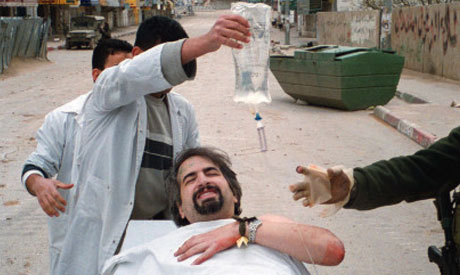
Anthony Shadid receives assistance from medics after being shot in the shoulder while reporting in the West Bank city of Ramallah March 31, 2002. (Photo:AP)
New York Times reporter Anthony Shadid, a Pulitzer Prize-winning journalist whose richly crafted dispatches captured more than a decade of Middle East turmoil, has died in Syria of an asthma attack.
Shadid, 43, had snuck into the country to report on Syria's increasingly bloody crackdown on a pro-democracy revolt, and the asthma attack Thursday was apparently brought on by horses used by guides, the Times said.
"Anthony died as he lived -- determined to bear witness to the transformation sweeping the Middle East and to testify to the suffering of people caught between government oppression and opposition forces," the paper's executive editor Jill Abramson wrote in an email to Times staff.
Shadid won two Pulitzer Prizes -- US journalism's highest honor -- in 2004 and 2010 for his coverage of the US-led invasion of Iraq and the war's chaotic aftermath for the Washington Post.
An American of Lebanese descent who spoke fluent Arabic, Shadid documented the war through wrenching stories of ordinary Iraqis in "Night Draws Near: Iraq’s People in the Shadow of America’s War," published in 2005.
More recently, he had reported on the revolts sweeping the Arab world from Egypt, Bahrain, Syria and Libya -- where he and other Times reporters were detained and abused by forces loyal to Moamer Kadhafi.
Condolences poured in as the news spread via Twitter and other online forums late Thursday.
"Heartbroken by the loss of the NYT's Anthony Shadid in Syria. One of the world's bravest and best journalists," US ambassador to the United Nations Susan Rice tweeted.
"RIP Anthony Shadid. An inspiration & role model to every Arab American journalist, a brilliant and courageous writer," NBC News correspondent Ayman Mohyeldin wrote on the micro-blogging site.
Shadid began his reporting career by working for the Associated Press from 1995-1999, based in Cairo. He later went on to work for the Boston Globe and the Washington Post and joined the Times in 2009.
In 2002 he was shot in the shoulder while reporting on an Israeli incursion into the occupied West Bank for the Boston Globe.
He is survived by a wife and two children.
In his final article for the Times, Shadid wrote about the chaotic situation in Libya, where rival militias have replaced Kadhafi, who was overthrown and killed by rebels last year.
"It ran long, at more than 1,600 words, which was typical of Mr. Shadid’s work. It was splashed on the front page of the newspaper and the home page of the website, nytimes.com, which was also typical," the newspaper said.
In its obituary, the Times published an excerpt from a new book by Shadid, "House of Stone," to be published next month, in which he described the aftermath of Israel's air assaults on south Lebanon during the 2006 war.
"Some suffering cannot be covered in words," he wrote. "This had become my daily fare as reporter in the Middle East documenting war, its survivors and fatalities, and the many who seem a little of both.
"In the Lebanese town of Qana, where Israeli bombs caught their victims in the midst of a morning’s work, we saw the dead standing, sitting, looking around.
"The village, its voices and stories, plates and bowls, letters and words, its history, had been obliterated in a few extended moments that splintered a quiet morning."
Short link: